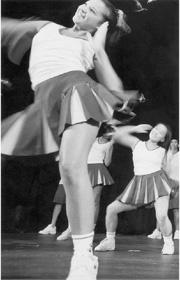AFTER HE BREAKS a guitar string on stage, Paul Pena is handed an instrument that looks something like a square banjo covered in snakeskin. “Whatever,” the large bluesman says easily, brushing off what could have been a setback. But then again, this switching of instruments is just another drop in the bucket for Pena, a blind Creole-American from San Francisco who’s already way out of his element in the small republic of Tuva (wedged between Mongolia and Russia), competing in a throat-singing contest in which the first prize is a horse. With nothing to lose, Pena starts plucking the foreign instrument and improvises a song in Tuvan, a language of which he knows perhaps 20 words.
GENGHIS BLUES
directed by Roko Belic
starring Paul Pena and Kongar-ol Ondar
plays August 20-26 at Varsity
The audience goes wild, ecstatic that this strange American has mastered their cherished art of kargyraa throat singing. The technique, which unleashes a latent ability in the vocal cords, produces reverberating tones that are akin to the warbling drones of an Australian didgeridoo. Performed in a high voice, throat singing sounds like what a piccolo might sound like if it sprung to life on its own—gushing in excited, animated whistles. In Pena’s extraordinarily deep voice, the rumblings come stealthily but surely as if from a great volcano, earning him the nickname of “Earthquake.”
It’s hard to resist the magic of the often scruffy Genghis Blues. Pena’s sincerity and talent not only shine through the rough edges of the documentary, they make it seem all the more precious for its ingenuousness. Full of music and character, Roko and Adrian Belic’s film is the very antithesis of packaged slickness ࠬa MTV, which too often turns performers into generic copies of one another.
Pena’s one-of-a-kind journey began in 1984 when he picked up a Russian broadcast of Tuvan throat singing on his short-wave radio. Entranced, he recorded the program and proceeded for the next decade to teach himself how to imitate the eerie sounds. Pena also taught himself a few basics of the Tuvan language through translating Tuvan into Russian then into English—all in Braille. Then, in 1993, Pena attended a concert in San Francisco given by a group of Tuvan throat singers. Afterwards, he approached one of the performers, Kongar-ol Ondar, and impressed him with a demonstration of his own throat singing. Ondar, who is Tuva’s “National Artist” and possesses in his country the fame of Elvis Presley, invited Pena to participate in Tuva’s triennial throat-singing contest.
In the meantime, Chicago brothers Roko and Adrian Belic, fresh out of college, wanted to travel to Tuva to make a film. Having grown up on a steady diet of PBS—their mother once fixed the TV so that it would only get the educational channel—they had long been fascinated with documentaries of foreign cultures. Genghis Blues is the result of Pena and the Belics’ chance discovery of one another and subsequent decision to collaborate.
The Belics portray Tuva as an exotic country unspoiled by modern globalization, one of the last “adventure outposts” that inspire the explorer’s imagination. The film shows a sparse country of hills and mountains, a place where the lore of Genghis Khan invokes popular pride and where over a third of the 300,000 inhabitants continues the nomadic tradition of animal herding. Infused with this idyllic vision, the film is more romantic travelogue than documentary as it follows Pena and several other San Francisco musicians enchanted by Tuva’s relatively primitive culture. Never mind that Ondar is wearing a Cal Tech sweatshirt in one scene or that a shaman totes a briefcase, the film emphasizes the Tuvans’ attachment to timeless traditions—such as a sacred sheep-slaughtering ceremony in which the animal’s blood is not allowed to touch the ground. One member of the group, Lemon DeGeorge, grows especially tiresome, at one point musing that because of the Tuvans’ ties to the land and traditions, “no politics can ever touch them.” The film also harps on Pena’s difficulties as a blind black man living in the United States, in contrast to the friendly welcome he receives in his short time in Tuva.
Ultimately, the Belics’ naivete can be forgiven; the film triumphs as a reminder of the universal power of music and of individual will in the face of seemingly insurmountable obstacles. In its best moments, Genghis Blues provides some good old-fashioned inspiration. Pena’s hybrid brand of throat singing is transcendent, wowing the viewer and turning the blues into pure joy.






